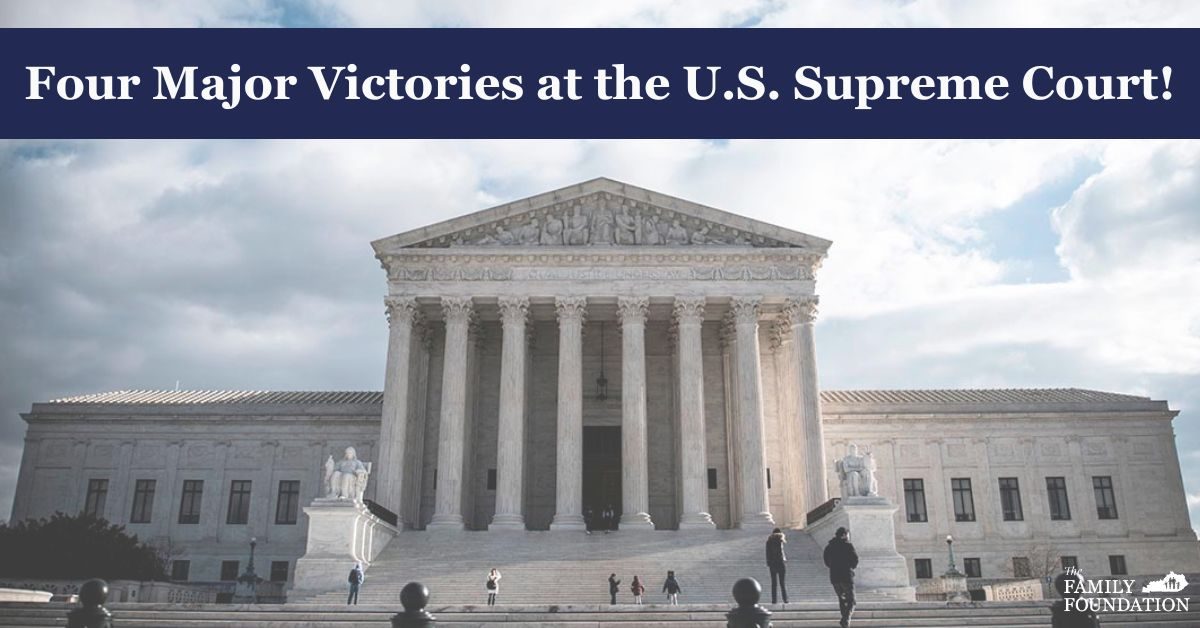The past year has been filed with major legal battles surrounding pro-family policies, and thankfully the Lord has given us several huge wins in the recent U.S. Supreme Court term that ended in June. In cases dealing with protecting kids from gender “transitions” and online pornography, parental rights in government schools, and defunding Planned Parenthood, we saw major victories for families and children.
United States v. Skrmetti
In U.S. v Skrmetti, the Supreme Court decided if laws that protect children from harmful and experimental gender “transitions” violate the Fourteenth Amendment of the U.S. Constitution. 25 states, including Kentucky, currently have Help Not Harm laws that protect kids from such procedures. However, the ACLU and other radical LGBT advocates, including the Biden Justice Department, couldn’t accept their policy defeats in those states and sought to invent a right to mutilate kids in the U.S. Constitution. They sued to stop Help Not Harm laws in several states, including Kentucky, and Tennessee’s law ended up before the Supreme Court.
In a 6-3 decision written by Chief Justice John Roberts, the Supreme Court ruled that Help Not Harms laws do not violate the Fourteenth Amendment’s Equal Protection Clause. Therefore, the laws only need to pass the rational basis test, the lowest level of scrutiny that courts apply to laws. And the majority concluded that states have a legitimate interest in protecting kids from gender “transitions,” allowing the laws to go into effect. Now that the Supreme Court has definitively spoken on this issue, we encourage the rest of the 25 states to protect kids from harmful gender ideology by passing their own versions of Help Not Harm!
Free Speech Coalition v. Paxton
In Free Speech Coalition v Paxton, the Supreme Court decided if laws that protect children from online pornography through age verification requirements violate the First Amendment to the U.S. Constitution. 24 states, including Kentucky, currently have laws on the books that require pornographic websites to age verify before users may access their content. In response to these laws, allies of the pornography industry, under the false guise of protecting free speech, sued to stop these laws from going into effect. Texas’s law ended up before the Supreme Court.
In a 6-3 decision written by Justice Clarence Thomas, the Supreme Court ruled that age verification laws do not violate the First Amendment and that states may fully enforce their laws. The majority applied intermediate scrutiny, which is a mid-tier level of scrutiny, and concluded that protecting kids from pornography is an important government interest and age verification laws are substantially related to protecting kids. Now that this issue is settled, we encourage the 26 other states to pass age verification laws, so that every American child is protected from online pornography.
Mahmoud v. Taylor
In Mahmoud v Taylor, the Supreme Court decided if government schools must give religious parents notice and/ or an opportunity to opt out of mandatory LGBT curriculums. The Montgomery County, Maryland School Board adopted a policy requiring certain LGBT books in English classes, starting as young as kindergarten. The school board also attempted to eliminate religious opt outs from the books, forcing religious parents to expose their kids to radical gender ideology against their will and beliefs. In response to this policy, a coalition of Christian, Muslim, and Jewish parents sued, arguing that the policy violates the First Amendment.
In a 6-3 decision written by Justice Samuel Alito, the Supreme Court ruled that government schools must give parents notice and an opportunity to opt out when they seek to require a curriculum that would violate a core tenant of a parent’s faith. The majority concluded that teachings about sexuality are deeply engrained within the faiths of the parents involved in the case and the school’s policies would encroach upon those beliefs. In Kentucky, schools must receive a parental opt-in before speaking to students about issues related to sexuality.
Medina v. Planned Parenthood South Atlantic
In Medina v Planned Parenthood South Atlantic, the Supreme Court decided if states violated federal law when they defunded Planned Parenthood from state Medicaid programs. A few years ago, South Carolina attempted to remove Planned Parenthood from Medicaid, but abortion advocates successfully sued to block the plan. In a 6-3 decision by Justice Neil Gorsuch, the Supreme Court ruled in favor of South Carolina, opening the door for them and other states to defund Planned Parenthood. The Family Foundation supports removing all abortion providers from government programs and will advocate for a total ban next legislative session.
We also had a victory in state court. At the end of last year, the ACLU and abortion advocates sued in state court to try and block Kentucky’s pro-life laws, attempting to invent a right to murder the preborn in the state constitution. However, the ACLU recently announced that they were dropping that lawsuit, ensuring that Kentucky pro-life laws remain in effect for the time being. Please continue to pray that our righteous laws will withstand any further attacks from the advocates for the culture of death.
Click here to view and download the PDF of the print version of the Citizen paper.

